Top 10 AI Agent Platforms for 2025
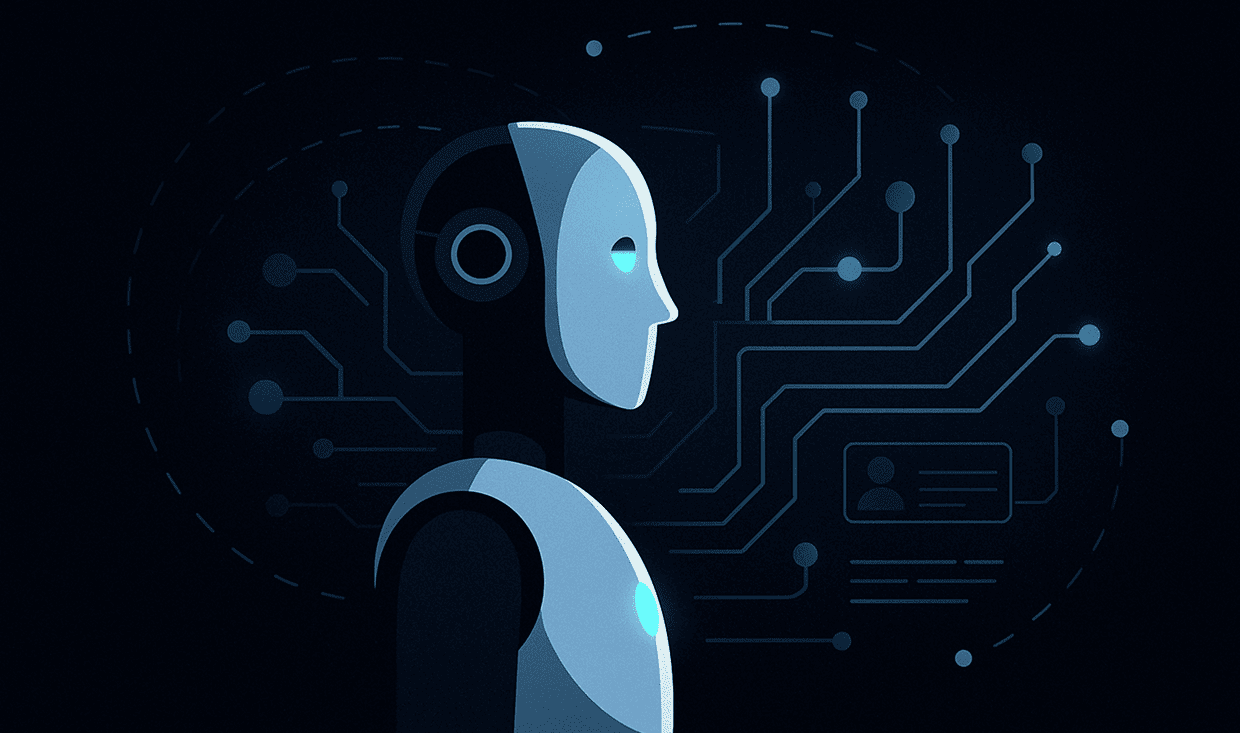
Table of Content
Top 10 AI Agent Platforms for 2025
What if your business had an employee who never slept, never made mistakes, and could handle hundreds of tasks at once? In 2025, this dream is becoming a reality with AI agent platforms.
That's the promising future AI agents are bringing to the table in 2025.
These platforms don't just chat, they think, act, and deliver results. From closing support tickets in seconds to scheduling sales calls on autopilot, AI agents are fast becoming the behind-the-scenes powerhouse for modern businesses.
Reports from McKinsey show that generative and agentic AI could add trillions in economic value, highlighting the transformative potential of this wave.
But here's the catch: with so many tools calling themselves "the best AI agent platform," how do you know which ones actually live up to the hype?
This guide is here to provide the answers. Let's delve into the top 10 AI agent platforms of 2025, what sets them apart, and how to select the best one for your business.
What Is an AI Agent Platform?
An AI agent platform is a system that enables you to create and manage AI-powered agents, digital assistants that not only chat but also think, decide, and act across your business tools.
Instead of following pre-set scripts like chatbots, agents built on these platforms can:
- Understand the context of a request.
- Choose the right action (not just answer)
- Connect with apps like CRM, email, or support systems.
- Complete tasks such as updating records, resolving tickets, or sending follow-ups
Think of it as the bridge between artificial intelligence and real business workflows. It's what makes AI useful not just for conversation but for actually accomplishing work.
How to Choose the Best AI Agent Platform (Buyer's Framework)?
Choosing an AI agent platform isn't about chasing the flashiest AI features.
It's about finding the one that blends seamlessly into your business and makes a measurable difference from day one.
Some platforms are designed for quick wins, while others are built for enterprise-scale reliability. Here's how to choose the best AI agent platform:
1. Define your first use case
Don't think about "AI everywhere," think about one problem worth solving now.
- A support-heavy business might need agents who reduce ticket queues.
- A sales-driven team may want faster lead qualification and follow-ups.
- Operations teams often look for workflow automation and system orchestration.
The best platforms aren't "AI for everything." They're the ones that nail your first critical use case and prove ROI fast.
2. Check integrations
A demo can wow you with smart answers, but what happens when it needs to work with your CRM, Slack, or helpdesk?
If it can't connect, your team ends up juggling more tools instead of fewer. Look for:
- Deep CRM or helpdesk integrations
- Email, calendar, and communication sync
- API or webhook support for custom logic
Integration is where flashy AI platforms often stumble, and it is here that the real winners prove their worth.
3. Review security and governance
Agents will act on live business data. Without governance, that's a risk. Strong platforms give you:
- Clear permission settings
- Activity logs you can audit
- Compliance badges that matter in your industry
For enterprises, this isn't a "nice to have." It's the dealbreaker between a pilot project and full-scale adoption.
4. Match to your team's skills
Not every business has a squad of developers. That's why platform fit matters.
- Non-technical teams → look for drag-and-drop builders that anyone can use.
- Technical teams → prioritise flexible APIs and custom configuration.
The "best" AI agent platform is the one your people will actually use, not the one that looks impressive on a slide deck.
5. Understand pricing and scalability
Pricing is where excitement fades if you don't ask the right questions:
- Does the cost scale per user, per run, or per workflow?
- What's included in the base package vs. an expensive add-on?
- How predictable is the pricing as usage grows?
The smartest buyers know: a platform that feels affordable today can become the most expensive mistake tomorrow.
Best AI Agent Platforms to Watch in 2025
The race for the best AI agent platforms is heating up in 2025. Businesses aren't asking if they should use AI agents anymore; they're asking which AI platform is best to handle their sales, support, and operations.
With so many AI platform companies competing, it's tough to separate real value from hype.
That's why we've put together this comparison of the top AI agent platforms in 2025, showing what each is best for, their key features, and where they stand.
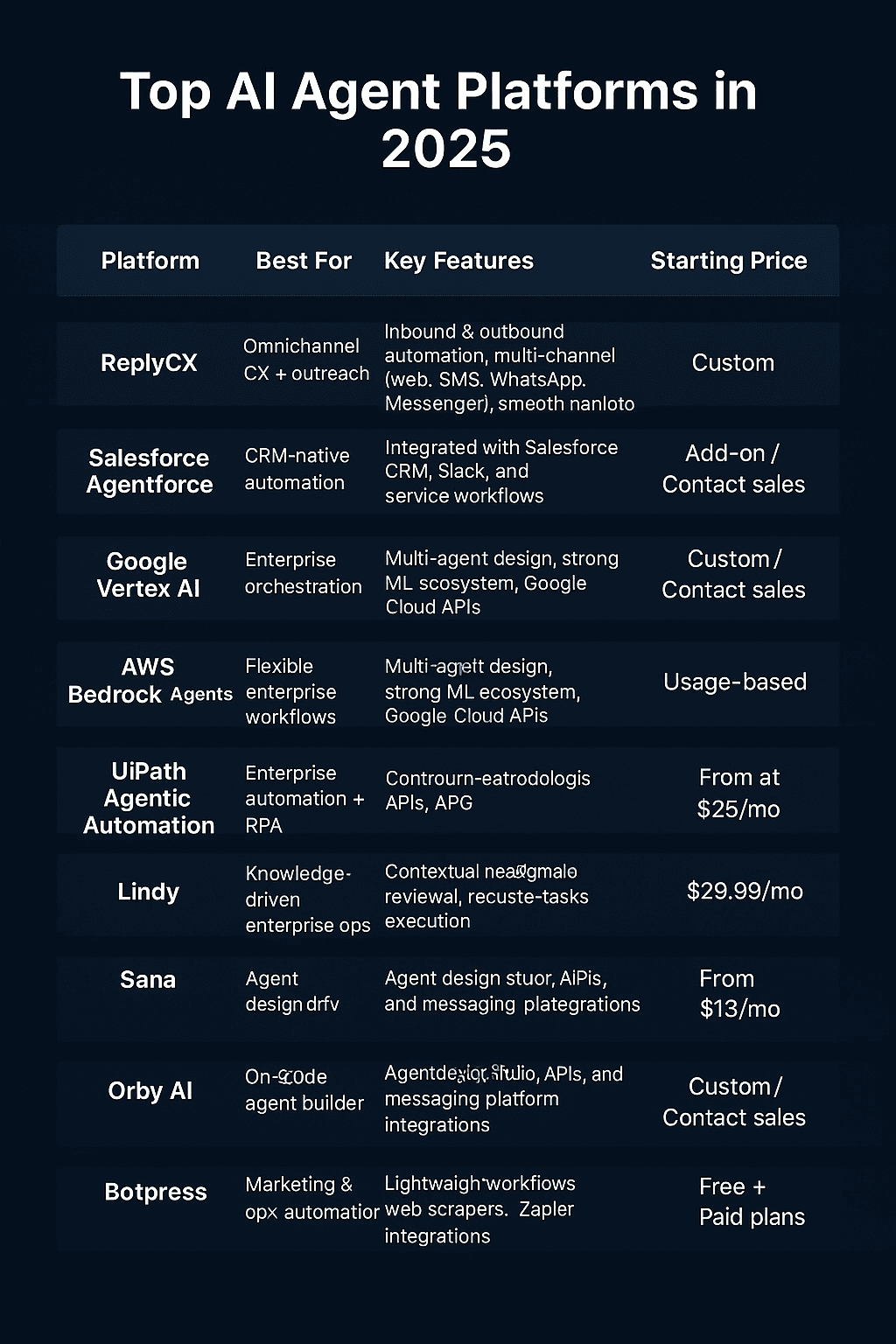
1. ReplyCX - Best for Omnichannel Sales & Support
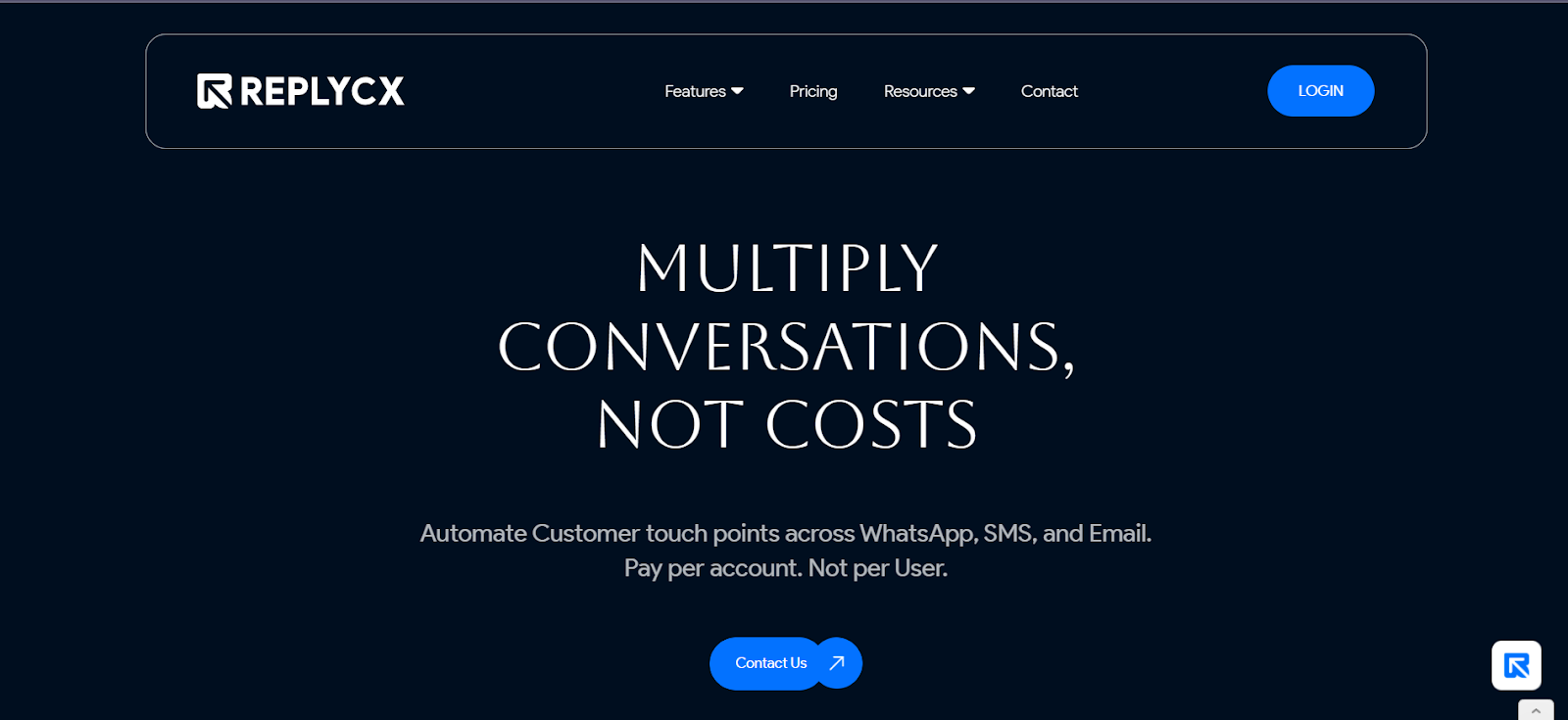
ReplyCX is designed for businesses that want to unify customer conversations and outbound outreach under one roof.
Unlike many platforms that focus solely on chat or ticket automation, ReplyCX handles both sides, responding to inbound queries and proactively reaching out via SMS, WhatsApp, email, and Messenger. This makes it a strong choice for teams that care about end-to-end customer journeys. Explore its AI Agent Studio, check pricing, or review the comparison with Botpress.
Key Features:
- Inbound automation across web, SMS, WhatsApp, Messenger, and email
- Outbound automation for campaigns and follow-ups
- No-code workflow builder with fast setup
- Smooth AI-to-human handoff when needed
- CRM and e-commerce integrations for real-time updates
- Performance analytics to track automation impact
Pricing:
- Starter Pack - $79/month (basic automation, up to 3 agents)
- Growth Pack - $199/month (adds live chat, CRM integrations, advanced analytics)
- Pro Pack - $499/month (built for mid-sized and advanced teams)
Benefits:
- Combines inbound + outbound in one platform
- Easy to deploy with no heavy developer effort
- Strong channel coverage for both support and sales
- Scales well for growing teams
ReplyCX provides practical automation for both customer experience and sales, without overwhelming teams. For companies that want agents to engage, convert, and support customers across channels, it delivers fast value in a competitive landscape.
2. Salesforce Agentforce - Best for CRM-Native Automation
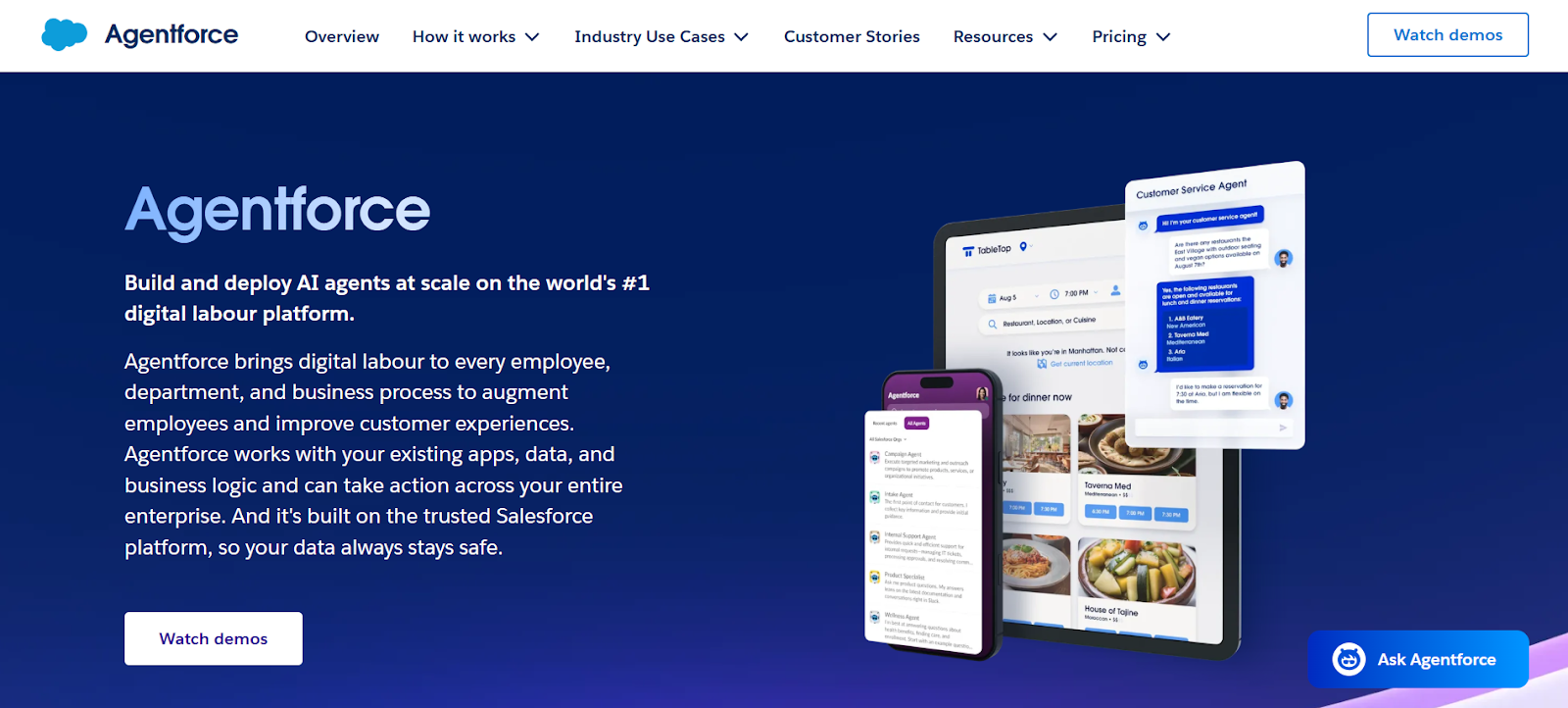
Salesforce Agentforce is built directly into the Salesforce ecosystem, making it the natural choice for companies already using Salesforce for sales, service, and marketing. Unlike standalone AI agent platforms, Agentforce works inside your existing Salesforce setup, giving you AI-powered agents that can act on your CRM data in real time.
Key Features:
- Native integration with Salesforce Sales Cloud, Service Cloud, and Slack
- AI agents designed for customer service, sales outreach, and workflow execution
- Access to Salesforce's Einstein AI for predictive insights
- Multi-channel support inside the Salesforce ecosystem
- Real-time actions on CRM data (lead updates, ticket routing, pipeline automation)
Pricing:
- Agentforce Add-ons – $125/user/month (for Sales, Service, and Field Service)
- Agentforce Industries Add-ons – $150/user/month (for Industry Clouds)
- Agentforce 1 Editions – from $550/user/month (includes Agentforce add-on, available for Sales, Service, Field Service, and Industries)
Benefits:
- Seamlessly fits into Salesforce environments
- Strong for sales and service teams who already rely on Salesforce daily
- Deep CRM data access makes agents more accurate and context-aware
- Trusted brand with enterprise-grade compliance and security
Limitations:
- Only valuable if your business already uses Salesforce
- Add-on pricing can be expensive on top of existing licenses
- Less flexible for teams wanting a standalone AI agent platform
3. Google Vertex AI - Best for Enterprise Orchestration
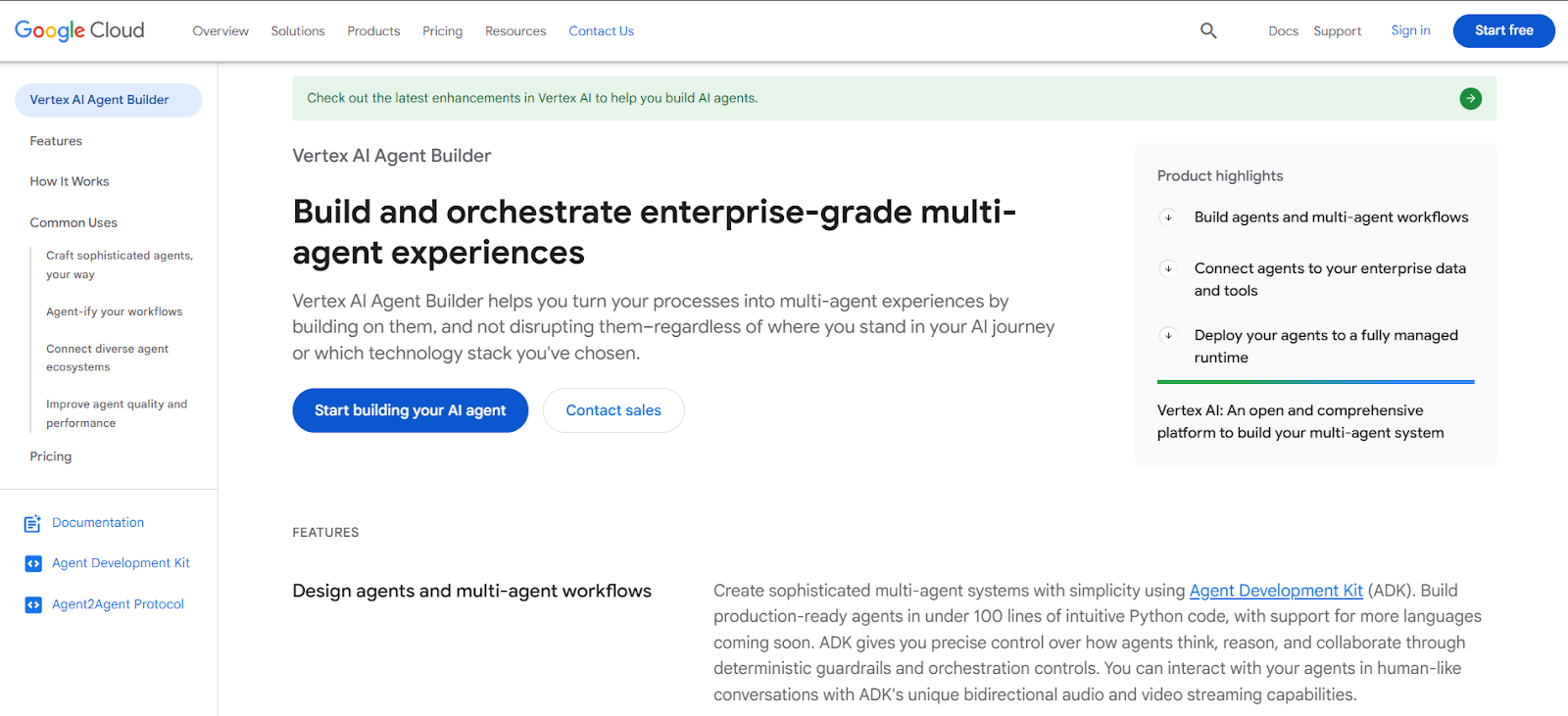
Google Vertex AI has positioned itself as a powerful AI agent builder platform for enterprises that want to scale, orchestrate, and leverage advanced ML capabilities.
Unlike lighter tools aimed at startups, Vertex AI enables businesses to design, deploy, and monitor complex, multi-agent workflows across data-intensive environments.
Key Features:
- Multi-agent design and orchestration with Google Gemini models
- Deep integration with Google Cloud services and APIs
- Custom model training for domain-specific use cases
- Strong support for data pipelines, analytics, and AI lifecycle management
- Enterprise-grade monitoring, guardrails, and governance features
Starting Price:
- Custom pricing based on usage (contact Google Cloud sales)
Benefits:
- Ideal for enterprises already using Google Cloud infrastructure
- Combines AI reasoning with Google's advanced ML and data tools
- Strong scalability for large-scale workflows
- Governance features suitable for regulated industries
Limitations:
- Too complex for SMBs or non-technical teams
- Requires in-house technical expertise to maximise value
- Costs can grow quickly with heavy usage
4. AWS Bedrock Agents - Best for Flexible Enterprise Workflows
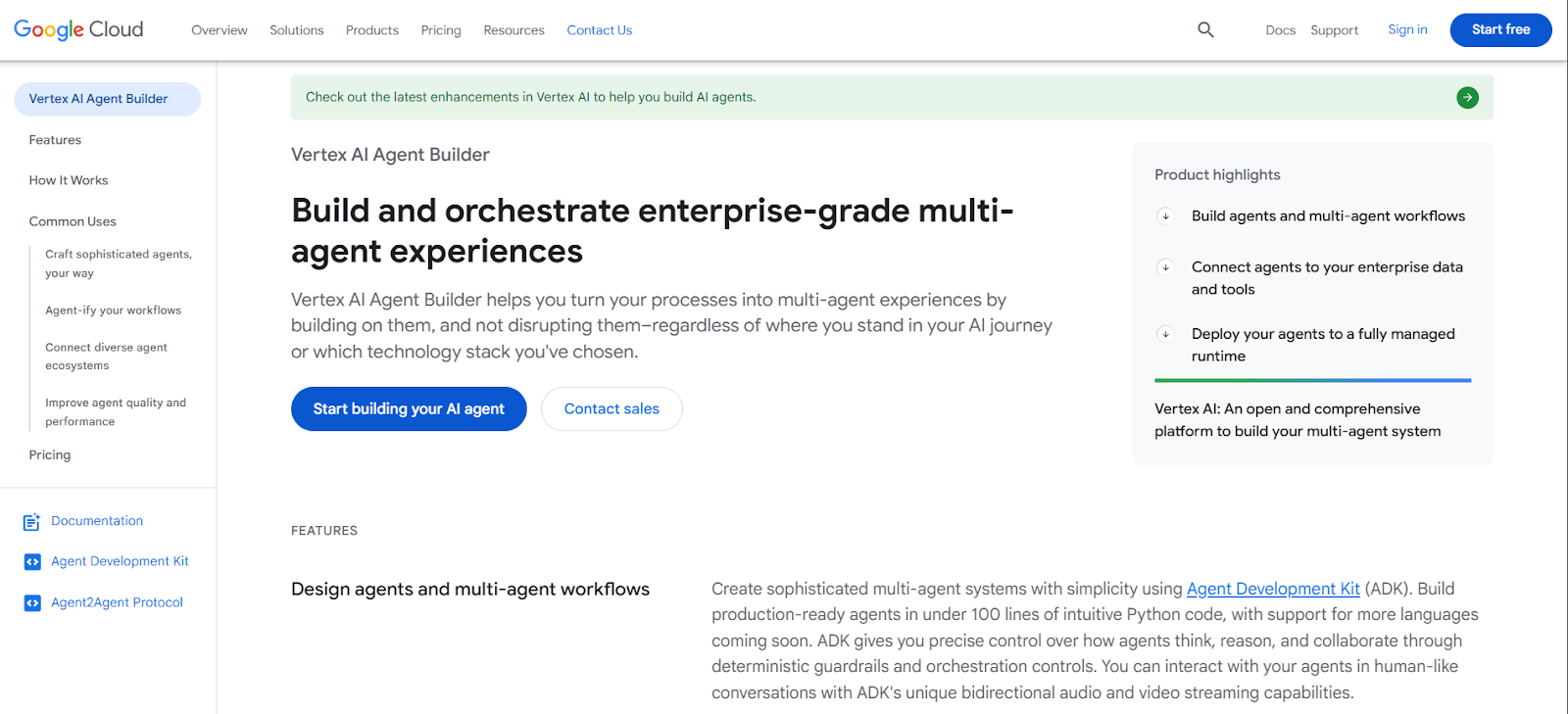
AWS Bedrock Agents are designed for enterprises that want scalable, customizable AI agents without building everything from scratch.
They follow a "supervisor-worker" model, meaning one agent can manage multiple sub-agents to handle different tasks, making them highly flexible for complex workflows.
Key Features:
- Multi-agent architecture (supervisor + workers)
- Access to a wide range of foundation models via AWS Bedrock
- Deep integration with AWS ecosystem (S3, Lambda, DynamoDB, etc.)
- Tools for compliance, monitoring, and governance
- Support for APIs and custom business logic
Starting Price:
- Usage-based pricing (depends on models and services used)
Benefits:
- Highly scalable for enterprises with complex or multi-step workflows
- Flexible, choose from multiple LLMs, not locked into one model
- Strong security and compliance features within the AWS cloud
- Ideal for organisations already invested in AWS infrastructure
Limitations:
- A steep learning curve requires technical expertise to implement
- Costs can become unpredictable with large-scale usage
- Less suited for SMBs or teams without cloud engineers
5. UiPath Agentic Automation - Best for Enterprise Automation + RPA
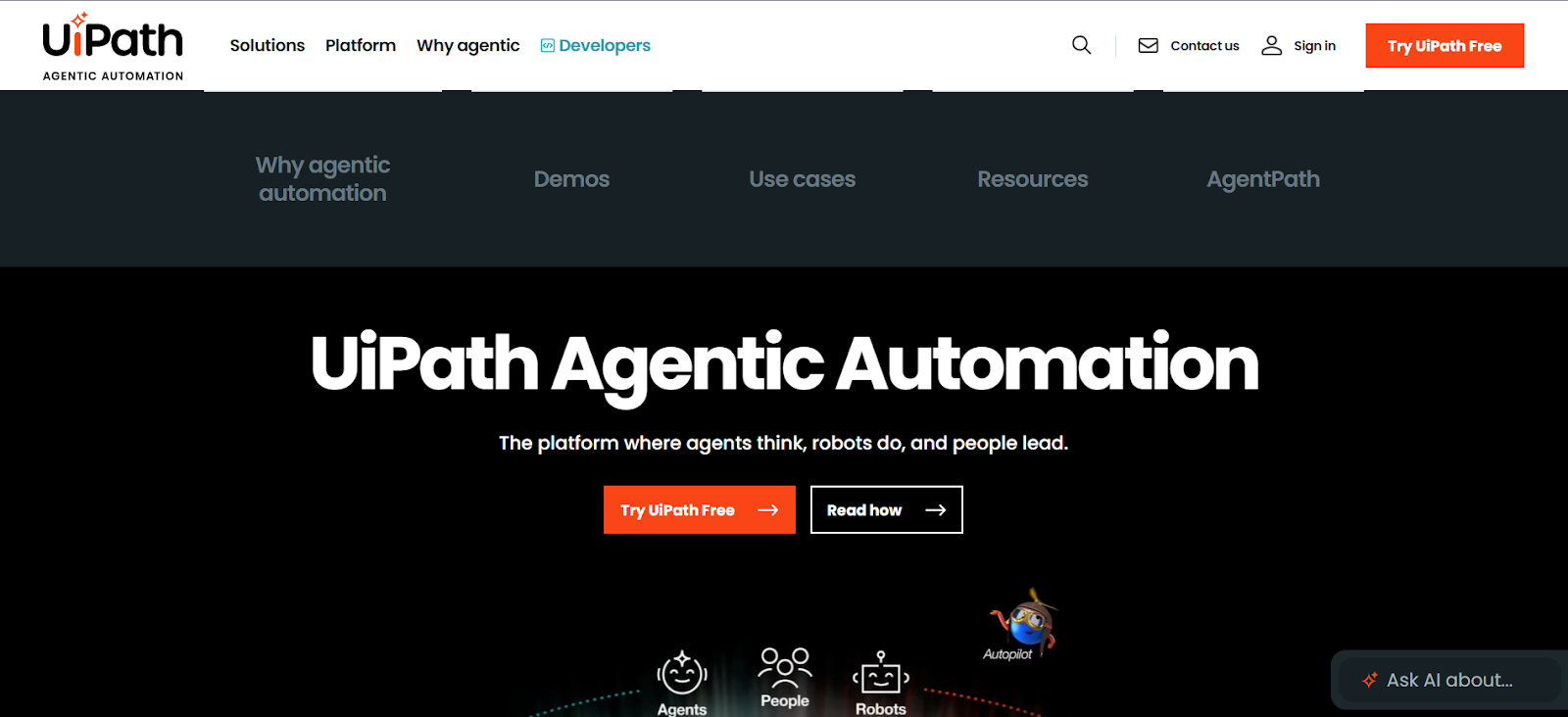
UiPath, long known for its robotic process automation (RPA) capabilities, has expanded into AI agents through its Agentic Automation framework.
Unlike platforms focused solely on conversations, UiPath combines the structure of RPA with the intelligence of AI, providing enterprises with agents that can handle both repetitive tasks and reasoning-based workflows.
Key Features:
- Combines RPA with AI-driven decision-making
- Integrations with ERP, ITSM, CRM, and enterprise apps
- Orchestration of multi-step, cross-department workflows
- Governance and compliance features for regulated industries
- Advanced monitoring and analytics for automation performance
Starting Price:
- Starting at 25$/month
- Custom/enterprise pricing (contact UiPath sales)
Benefits:
- Bridges traditional automation (RPA) with modern AI capabilities
- Strong fit for enterprises already using UiPath for automation
- Proven in large organisations with compliance-heavy requirements
- Can handle structured + unstructured tasks together
Limitations:
- A complex setup requires IT teams and training
- Not a good fit for startups or SMBs due to cost and complexity
- Focused more on enterprise process automation than sales/CX
BlockQuote: Also read: Agentic AI vs AI Agents
6. Lindy - Best for Team and Personal Productivity

Lindy positions itself as a personal and team AI assistant that can handle everyday tasks, such as scheduling, email, and research.
Unlike heavy enterprise platforms, Lindy is designed to be simple, fast, and affordable, making it a suitable choice for startups, small teams, and professionals who want AI agents to save time without requiring large IT setups.
Key Features:
- Automates scheduling, email replies, and meeting coordination
- Can perform research and basic data tasks
- Integrates with tools like Slack, Notion, and email
- Designed for both individual users and small teams
- Easy onboarding with a user-friendly interface
Pricing:
- Free – $0/0/month (400 credits, up to 40 tasks)
- Pro – $29.99/month (3,000 credits, 1,500 tasks, 30 calls)
- Business – $199.99/month (20,000 credits, unlimited calls, 30+ languages)
- Enterprise – Custom pricing with advanced support & security
Benefits:
- Affordable entry point compared to enterprise platforms
- Flexible work works for both individuals and small teams
- Great for boosting productivity without a complex setup
- Easy to adopt without technical knowledge
Limitations:
- Limited enterprise-grade integrations and compliance features
- Not built for large-scale workflows or regulated industries
- More of a "generalist assistant" than a deep workflow automation tool
7. Sana - Best for Knowledge-Driven Enterprise Operations

Sana is an AI agent platform built around knowledge retrieval and enterprise productivity.
Instead of focusing on customer-facing automation, Sana shines inside organisations by making company knowledge instantly accessible through AI-powered agents.
This makes it valuable for enterprises that want employees to spend less time searching for information and more time acting on it.
Key Features:
- AI agents designed for contextual knowledge retrieval
- Integrates with enterprise knowledge bases and document systems
- Supports collaborative workflows across teams
- Provides real-time answers from company data
- Security and compliance controls for enterprise environments
Pricing:
- Core Plan – $13/user/month (minimum 300 users, annual license)
- Enterprise Plan – Custom pricing (with advanced features and integrations)
Benefits:
- Strong at turning company knowledge into actionable insights
- Helps teams make faster, data-backed decisions
- Enterprise focus with compliance features
- Useful for onboarding, internal training, and daily operations
Limitations:
- Limited focus on customer-facing automation (sales, support)
- Still maturing compared to long-established enterprise platforms
- Requires proper data setup to deliver maximum value
8. Orby AI Acquired By Uniphore - Best for Compliance-Driven Workflows
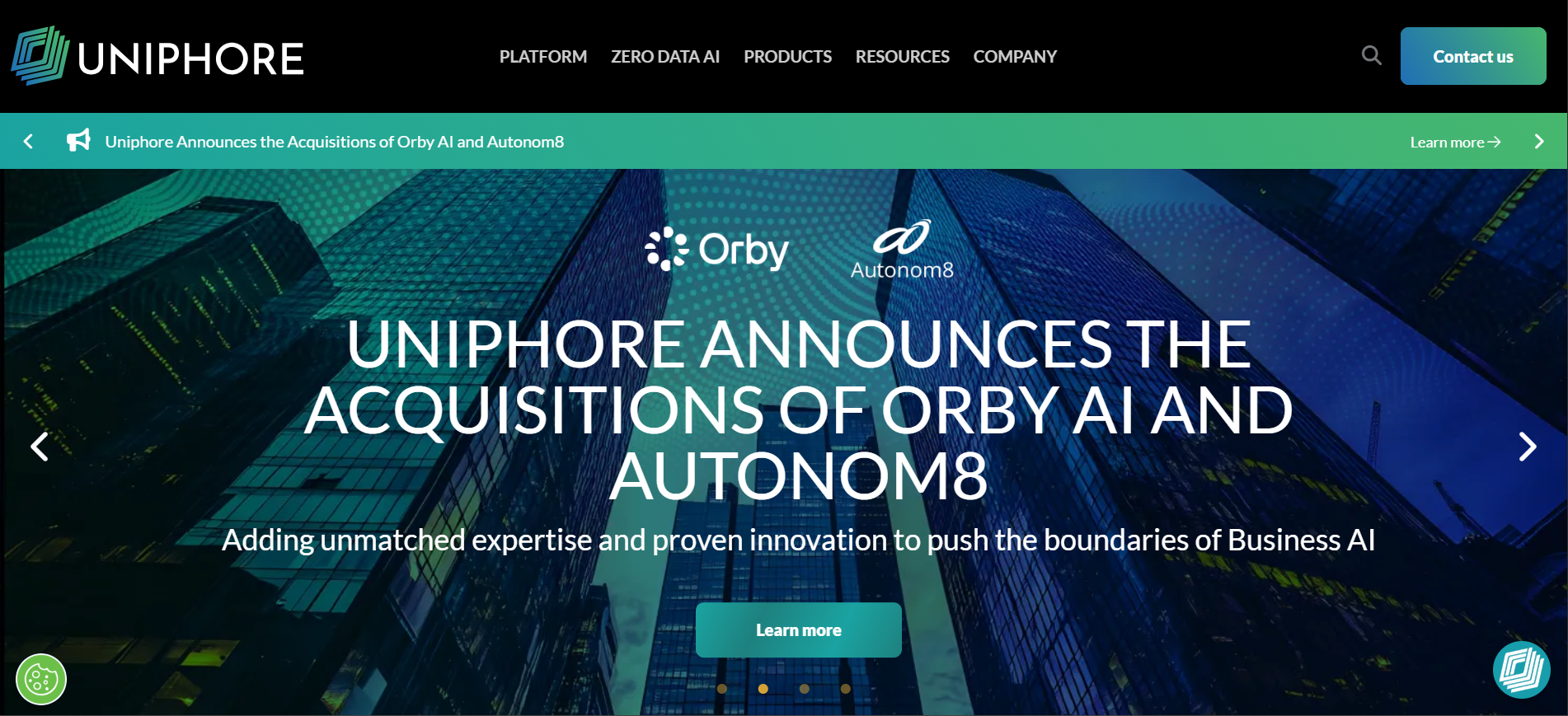
Orby AI, Acquired By Uniphore, takes a different approach compared to many platforms on this list. Instead of focusing broadly on sales or customer support, IT specialises in enterprise compliance, auditability, and secure automation.
It's designed for industries such as finance, healthcare, or government, where every AI action must be tracked, verified, and compliant with relevant regulations.
Key Features:
- "Large Action Model" is designed for secure decision-making
- Strong focus on compliance and audit trails
- Tools for approval workflows and human oversight
- Integrates with ERP and enterprise applications
- Built for industries with strict data and process rules
Benefits:
- Ideal for regulated industries requiring full transparency
- Provides detailed logs and guardrails for every AI action
- Focused on reducing compliance risks while automating workflows
- Enterprise-ready governance features
Limitations:
- A niche platform is not as broad for general use cases
- Smaller ecosystem compared to giants like AWS or Salesforce
- Requires enterprise-level adoption to show full value
9. Botpress - Best for No-Code Agent Building

Botpress is one of the most popular no-code AI agent builder platforms, known for giving both non-technical users and developers the tools to design and launch agents quickly.
Unlike heavier enterprise solutions, Botpress strikes a balance that is easy enough for small teams but flexible enough for developers to extend with APIs.
Key Features:
- Drag-and-drop agent design studio
- Integrations with messaging apps, APIs, and business tools
- Prebuilt modules for FAQs, workflows, and conversations
- Support for natural language understanding and multi-language bots
- Developer-friendly with open API support
Starting Price:
- Free tier available + paid plans for advanced usage
Benefits:
- Great balance between no-code simplicity and developer flexibility
- Affordable entry point with a generous free plan
- Active open-source community for support and extensions
- Fast to build and deploy lightweight AI agents
Limitations:
- Limited enterprise-grade governance and compliance features
- Not built for highly complex, regulated workflows
- May require developer involvement for advanced customisation
10. Gumloop - Best for Marketing & Operations Automation

Gumloop is a lightweight AI agent platform designed for marketing and operations teams that require quick automation wins without extensive setup.
It's not as enterprise-focused as AWS or Salesforce, but it excels in helping teams streamline tasks such as data scraping, data enrichment, and workflow automation with minimal effort.
Key Features:
- Prebuilt workflows for data scraping and enrichment
- Integrations with Zapier, APIs, and web tools
- Simple no-code interface for quick setup
- Focus on lightweight marketing and operations use cases
- Fast deployment with minimal technical skills required
Starting Price:
- Free tier + paid plans for advanced features
Benefits:
- Affordable and easy for SMBs and marketing teams
- Great for repetitive operations tasks (reports, scrapers, list building)
- No steep learning curve, business users can adopt quickly
- Helps bridge gaps without investing in heavy enterprise tools
Limitations:
- Not designed for complex enterprise automation
- Limited compliance and governance features
- Better as a supplement to core platforms, not a standalone enterprise solution
The world of AI agent platforms in 2025 is diverse, from enterprise giants like Google, AWS, and UiPath to agile tools like ReplyCX, Lindy, and Botpress. The best choice isn't about who's the biggest name, but about which platform fits your goals, your team, and your workflows.
AI agents are no longer hype; they're fast becoming the digital teammates that help businesses work smarter.
Blockquote: Insightful read: Best AI Chatbots for Customer Service in 2025
Your Future Starts with a Conversation.
- 30-minute commitment-free call
- Live product demo so you can see how AI customer service helps your business grow
- Discover how we can customize ReplyCX for your industry and business needs
Are AI Agents the Future or Just Hype?
Every new technology sparks hype, and AI agents are no different. But in 2025, the question isn't whether they're real; it's how far they can go.
On one side, AI agents are already proving their value. They reduce ticket backlogs in customer support, qualify leads in sales, and even handle back-office tasks like reporting and scheduling. Businesses that use them report faster workflows, lower costs, and improved customer experiences.
A Gartner prediction notes that by 2026, over 80% of enterprises will deploy generative or agentic AI in production.
On the other side, challenges remain. Agents still need human oversight to avoid mistakes, costs can escalate with large-scale deployments, and compliance guardrails are critical in regulated industries.
The truth? AI agents are not replacing people; they're augmenting teams. They free humans from repetitive tasks, allowing employees to focus on creativity, strategy, and relationship-building.
So, are AI agents a hype? No. They're here to stay, but their success depends on choosing the right platform, setting clear goals, and scaling responsibly. Companies that treat them as partners, not replacements, will see the biggest wins.
Conclusion
AI agent platforms aren't just another tool on the shelf; they're the next big shift in how businesses run.
From sales to support to operations, they're turning tasks that once drained time into automated wins.
The future belongs to teams that don't just watch this change happen, but adopt the right AI agent platform and let it become their competitive edge.
Whether that's an enterprise-scale orchestrator like Google Vertex AI, a CRM-native option like Salesforce Agentforce, or a blended omnichannel platform like ReplyCX, the question isn't whether you'll use them, it's how fast you'll get started.

Yash Shah
Yash Shah is a tech-savvy Growth Marketing Specialist (ReplyCX), skilled in accelerating business growth, performance marketing, and SaaS SEO. Certified in Growth Hacking and backed by 6,300+ LinkedIn followers, he combines strategic sales development with operational execution to build scalable results.


